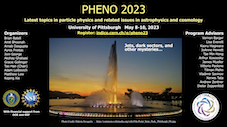Conveners
Cosmology III
- Brooks Thomas
-
Mr Biswajit Padhi (Colorado State University)09/05/2023, 16:30
When gravitational waves propagate through a medium with a changing equation of state, their spectrum distorts. A changing equation of state results from massive particles decoupling from the cosmic plasma as the temperature decreases. For low-frequency stochastic gravitational waves, this leads to deviations from the standard $k^3$ scaling. Interestingly, low-frequency waves emitted from...
Go to contribution page -
Itamar J. Allali09/05/2023, 16:45
Light dark relativistic sectors may undergo changes in the number of their relativistic species during the cosmological history (due e.g. to mass thresholds and/or phase transitions), similarly to the visible sector. When such changes occur around recombination, the stringent bound on the effective number of neutrino species, $N_{eff}$, can be relaxed and the value of the Hubble rate inferred...
Go to contribution page -
Gregory Suczewski (YITP, Stony Brook University)09/05/2023, 17:00
Primordial black holes (PBHs) are a well motivated, macroscopic alternative to particle-like dark matter. If present in the early universe, PBHs will accrete matter, producing high energy photons. The injection of high energy photons during the Dark Ages affects the thermal and ionization histories of the universe, leading to noticeable impacts on the CMB power spectra. In this talk, I will...
Go to contribution page -
Daniel Aloni (Boston University, Harvard University)09/05/2023, 17:15
In this talk, I will motivate the study of models of dark radiation. Dark radiation models might have a rich phenomenology, with imprints on cosmological observables. Upcoming CMB and LSS measurements will be sensitive to different signals, which makes the exploration of Dark radiation imprints timely. Moreover, we recently showed that Dark radiation might be an asset in solving the Hubble and...
Go to contribution page -
Wen Han Chiu09/05/2023, 17:30
We show how dark photons originating from an abelian Higgs model can be produced from the decay of the radial mode that acts as the curvaton, a light field during inflation that generates (part of) the adiabatic large scale cosmological primordial fluctuations.
Go to contribution page -
Mr Xucheng Gan (New York University)09/05/2023, 17:45
The portal connecting the invisible and visible sectors is one of the most natural explanations of the dark world. However, the early-time dark matter production via the portal faces extremely stringent late-time constraints. To solve such tension, we construct the scalar-controlled kinetic mixing varying with the ultralight CP-even scalar's cosmological evolution. To realize this and...
Go to contribution page -
Ms Wenzer Qin (MIT)09/05/2023, 18:00
With the prospect of detecting the cosmological 21 cm signal from the epoch of reionization just over the horizon, methods for extracting maximal cosmological information from this signal are increasingly timely. I will discuss recent work to further develop the effective field theory (EFT) for the 21 cm brightness temperature field during the epoch of reionization, incorporating renormalized...
Go to contribution page -
Dr Jeffrey Hyde (Swarthmore College)09/05/2023, 18:15
Recently IceCube announced the observation of high-energy neutrinos from the active galaxy NGC 1068. Due to the potential for scattering between signal neutrinos and cosmic background neutrinos, this observation is sensitive to neutrino self-interactions mediated by a massive scalar. In this talk I will present bounds based on the data, highlight the role that detector physics plays in this...
Go to contribution page
